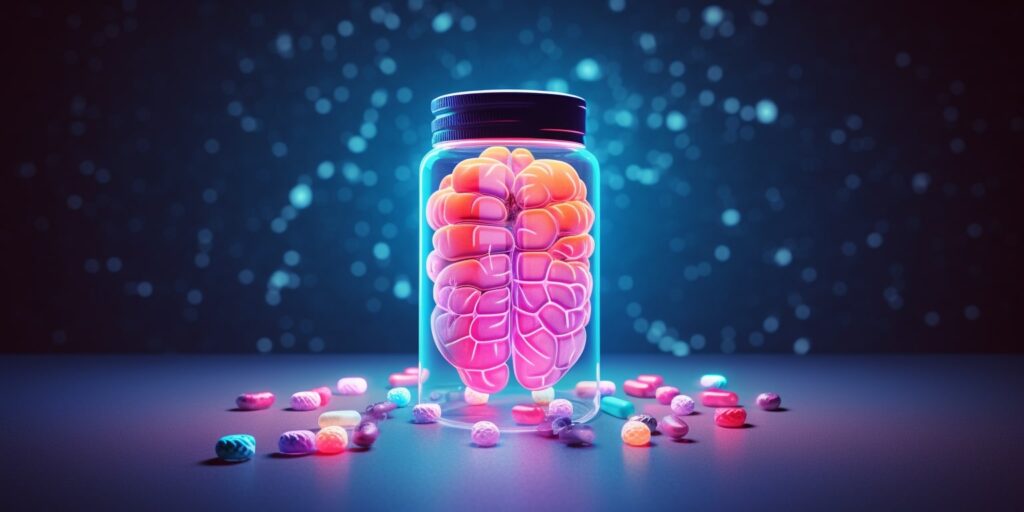Nootropics, also known as smart drugs, are substances that can help enhance brain function, including cognitive abilities such as memory, focus, and creativity. These supplements have been gaining popularity in recent years as more people seek ways to optimize their brain function and boost productivity.
But how exactly do nootropics work? What mechanisms are involved in their ability to enhance brain function? In this article, we’ll explore the science behind nootropics and their impact on brain function.
Key Takeaways:
- Nootropics, or smart drugs, are supplements used to enhance brain function.
- These substances can improve cognitive abilities such as memory, focus, and creativity.
- We’ll explore the mechanisms behind nootropics and how they work to enhance brain function.
What Are Nootropic Mechanisms?
Nootropics work by interacting with various molecular targets in the brain to enhance cognitive function. These substances have diverse mechanisms of action, which enable them to improve different aspects of brain performance.
One of the primary mechanisms of nootropics involves modulating neurotransmitter levels in the brain. Neurotransmitters are chemical messengers that allow brain cells to communicate with each other. By adjusting neurotransmitter levels, nootropics can influence different neural pathways and improve brain function.
Another mechanism involves enhancing blood flow and oxygen delivery to the brain. This helps brain cells to function optimally and has been shown to improve memory, attention, and other cognitive functions. Nootropics can also stimulate the growth and development of new brain cells, known as neurogenesis.
What Are Nootropic Mechanisms?
Nootropics may also enhance the activity of certain brain receptors, such as the NMDA and AMPA receptors. These receptors are involved in regulating learning and memory processes, and their activation can lead to improved cognitive function.
Furthermore, nootropics can regulate the levels of stress hormones in the brain, such as cortisol. By reducing stress levels, nootropics can improve cognitive performance and alleviate symptoms of anxiety and depression.
Overall, nootropics work by modulating various molecular targets in the brain to improve cognitive function. Understanding these mechanisms is crucial for identifying the most effective substances and optimizing their use.
Enhancing Cognition with Nootropics
Nootropics can have a significant impact on cognitive function, including attention, learning, and decision-making. So, how do they work?
Firstly, many nootropics increase blood flow and oxygen to the brain, allowing for better nutrient delivery and waste removal. This can improve brain function by enhancing energy metabolism and providing the brain with more resources to work with.
Secondly, nootropics can influence neurotransmitters, the chemicals that help our neurons communicate with each other. Some nootropics increase the production or release of neurotransmitters like acetylcholine, which is important for learning and memory, or dopamine, which affects motivation and mood.
Others can modulate the activity of receptors for these neurotransmitters, making them more or less sensitive to their effects. This can help to fine-tune brain function and enhance specific cognitive processes like attention and focus.
Finally, some nootropics can promote the growth of new neurons and connections in the brain through a process called neuroplasticity. This can help to enhance long-term memory and cognitive performance.
Overall, nootropics offer a range of mechanisms for enhancing cognitive function, making them a valuable tool for anyone looking to optimize their brain health and performance.
Boosting Memory with Nootropics
Nootropic mechanisms can also help boost memory function in various ways. Studies have shown that certain nootropics can improve both short-term and long-term memory.
One of the key ways in which nootropics can improve memory is by increasing the production of neurotransmitters like acetylcholine. Acetylcholine plays a crucial role in memory formation and retention.
Nootropics can also support the growth and survival of brain cells, enhancing neural communication and facilitating new connections. This can lead to improved memory function and recall.
Some nootropics also have antioxidant properties, protecting brain cells from damage and reducing the risk of age-related memory decline.
It is important to note that the effects of nootropics on memory can vary depending on the specific substance and individual factors such as age and health status. It is also important to use nootropics responsibly and in proper dosages to avoid any potential negative effects.
Overall, nootropics hold promising potential in the field of memory enhancement and further research is needed to fully understand their mechanisms and potential benefits.
Increasing Focus and Concentration
One of the most sought-after benefits of using nootropics is the ability to enhance focus and concentration. Nootropics achieve this through various mechanisms, including altering brain wave patterns and influencing neurotransmitter release and uptake.
Brain wave patterns: Nootropics can alter brain wave patterns, particularly increasing alpha waves. Alpha waves are associated with a relaxed but focused state of mind, leading to improved concentration.
Neurotransmitter release and uptake: Nootropics can impact neurotransmitter release and uptake, particularly dopamine and acetylcholine. Dopamine is involved in motivation, reward, and attention, while acetylcholine is involved in learning and memory. By enhancing the levels or activity of these neurotransmitters, nootropics can improve focus and attention.
It’s important to note that not all nootropics are created equal when it comes to focus and concentration. Some substances, such as caffeine and theanine, improve immediate focus but may not enhance long-term concentration. Others, such as racetams and modafinil, have been shown to improve both immediate and long-term focus and concentration.
Overall, nootropics can help increase focus and concentration through a variety of mechanisms, making them a popular choice for individuals looking to optimize their cognitive performance.
Nootropic Stacking and Synergy
While individual nootropics can produce significant cognitive benefits, combining them through nootropic stacking can enhance their effects. Nootropic stacking involves combining different substances to produce a synergistic effect that optimizes brain function.
The key to successful nootropic stacking is understanding the different mechanisms by which nootropics work. By carefully selecting nootropics that target different areas of brain function, users can achieve a more comprehensive and effective cognitive boost.
For example, combining a choline supplement with a racetam nootropic can enhance the racetam’s cognitive effects by improving synaptic connectivity and neurotransmitter synthesis. Similarly, combining a mood-enhancing nootropic like L-theanine with a stimulant like caffeine can produce a more balanced and sustained cognitive boost.
Types of Nootropic Stacks
There are several different types of nootropic stacks, each with its own unique benefits:
- Choline and Racetams: This stack combines a choline supplement with a racetam nootropic to enhance memory, focus, and overall cognitive function.
- Caffeine and L-Theanine: This stack combines a stimulant (caffeine) with a calming agent (L-Theanine) to produce a more balanced and sustained cognitive boost.
- Nitric Oxide and Creatine: This stack enhances physical and cognitive performance by improving blood flow and oxygen delivery to the brain and muscles.
It’s important to note that nootropic stacking should be done carefully and with proper dosages. Combining too many substances can lead to negative side effects, and some nootropics may interact poorly with certain medications.
Overall, nootropic stacking and synergy provide an exciting opportunity to optimize cognitive function and achieve peak mental performance. By carefully selecting and combining nootropics, users can achieve a more comprehensive and effective cognitive boost.
Potential Side Effects and Risks
While nootropics offer numerous benefits, it is important to be aware of the potential side effects and risks associated with their use.
The most commonly reported side effects of nootropics include headaches, nausea, anxiety, and insomnia. These side effects are usually mild and can be avoided or minimized by starting with low doses and gradually increasing as tolerated.
It’s also important to consider the potential risks associated with combining different nootropics, known as stacking. While some combinations may enhance the effects of each substance, others may lead to negative interactions and potentially harmful side effects. It’s crucial to do thorough research and consult with a healthcare professional before attempting to stack nootropics.
Finally, as with any substance, there is a risk of addiction and abuse with nootropics. It’s important to use these substances responsibly, following recommended dosages and avoiding prolonged or excessive use.
Overall, while nootropics offer numerous benefits, it’s important to approach their use with caution and mindfulness of potential side effects and risks.
The Future of Nootropic Research
Over the past few decades, the use of nootropics has gained popularity, leading to increased interest and research in this field. The mechanisms by which nootropics work in the brain are still not fully understood, but ongoing studies are shedding more light on the topic.
Researchers are focusing on understanding the molecular pathways and targets of these substances, as well as investigating the potential benefits of combining different nootropics. Additionally, studies are exploring how nootropics may impact neurological conditions such as Alzheimer’s disease and ADHD.
As research continues, we may see new nootropics being developed with even more targeted effects on brain function. Further insights into the mechanisms behind these substances may also lead to better understanding of other brain-related conditions, paving the way for more effective treatments.
Conclusion
Understanding the mechanisms behind nootropics is crucial for optimizing brain function. As we’ve explored in this article, nootropics work by interacting with neurotransmitters, receptors, and other molecular targets to provide various benefits, such as improved cognition, memory, and focus.
While the potential benefits of using nootropics are exciting, it’s also important to be mindful of potential risks and side effects. Proper dosage and caution are necessary to ensure safe and effective use.
The Future of Nootropic Research
As research into nootropics continues, there is much to be learned about these substances and their potential benefits for brain function. Ongoing studies and areas of interest may provide further insights into the mechanisms behind nootropics and how they can be used to enhance brain function.
Overall, nootropics have the potential to be a valuable tool for improving brain function, but it’s important to approach their use with caution and understanding of the underlying mechanisms.
FAQ
Q: What are nootropics?
A: Nootropics are substances that enhance brain function, improving cognition, memory, and focus.
Q: How do nootropics work?
A: Nootropics interact with neurotransmitters, receptors, and other molecular targets in the brain to enhance brain function.
Q: What cognitive benefits do nootropics offer?
A: Nootropics can improve cognitive functions such as attention, learning, and decision-making.
Q: Can nootropics boost memory?
A: Yes, nootropics can enhance both short-term and long-term memory function.
Q: How do nootropics increase focus and concentration?
A: Nootropics enhance attention and reduce distractions, leading to improved focus and concentration.
Q: What is nootropic stacking?
A: Nootropic stacking involves combining different nootropics to achieve enhanced effects.
Q: Are there any side effects or risks associated with nootropics?
A: While generally safe, improper dosage and misuse of nootropics can lead to potential side effects. Caution is advised when using these substances.
Q: What is the future of nootropic research?
A: Ongoing research is exploring the mechanisms and benefits of nootropics, with potential future developments in the field.

